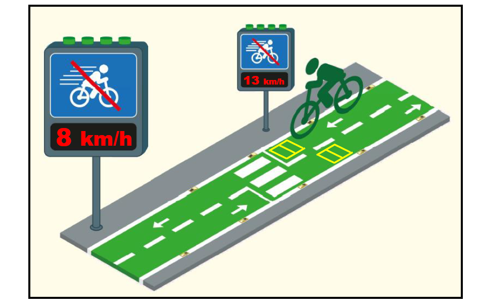The traffic and the range of personal mobility vehicles (PMVs) have increased rapidly in recent years.

Image Credit: Universitat Politècnica de València
Research by the MAPFRE Foundation approximates that nearly 1,200,000 people use e-scooters and electric bikes in Spain on a daily basis. However, regardless of the rise of these new kinds of mobility, there are still no devices that allow monitoring and control of their use efficiently and accurately, which has a negative effect on traffic management, the new kinds of mobility, and, eventually, road safety.
Currently, the Traffic Control Systems team from the Universitat Politècnica de València's Institute of Information and Communication Technologies (ITACA) has designed, built and approved the first road sensor that is customized for personal mobility vehicles.
The sensor has magnetic loops and can record and categorize the use of PMVs. By implementing the sensor, monitoring of the new kinds of mobility and, especially, road safety, for pedestrians as well as the other vehicles that travel all over the city on a daily basis would be possible.
Patented by the UPV, the sensor has been planned, developed and approved for use in urban settings. It can be set up on streets and roads with PMV traffic, either for shared or reserved lanes and one or two-way traffic.
While conventional vehicles are carefully monitored through the various sensors that are widely installed in cities, scooters, bikes, and other personal mobility vehicles lack accurate and efficient tools to perform this monitoring.
Antonio Mocholí, Director of the Traffic Control Systems Team, ITACA, Universitat Politècnica de València
“This situation has negative repercussions at several levels, most importantly with regard to safety, as current technologies are not able to monitor how they are being used, the traffic flows of PMVs and interactions with other users, or to detect potential hazards for each of them. The system that we have designed and approved allows us to obtain highly valuable information using an extremely cheap and reliable circuit,” Antonio Mocholí added.
The system, built in the laboratories of ITACA-UPV, is an upgrade on the existing magnetic loop sensors used for motorized vehicles, and it offers very useful tools for remotely examining PMV traffic.
One advantage is that it promptly gathers information about speed and direction of travel, making it feasible to assess traffic density in a particular area; and even the types of scooters (determined from their power) and the model of the vehicle.
The sensor is able to detect the magnetic footprint of each model of electric scooter and this allows us to identify its category and brand. Monitoring these parameters helps to improve compliance with municipal regulations and implement proper mobility planning, including the management of traffic lights, infrastructures, and routes when roadworks and maintenance are being carried out, etc.
Carlos Moyano Gómez, Bachelor's Degree Student, Telecommunication Technologies and Systems Engineering, School of Telecommunications Engineering, Universitat Politècnica de València
Carlos Moyano Gómezo took part in this study as part of his bachelor’s thesis.
Well-Received
The invention has received praise in the forums where the sensor has been presented.
In this regard, the Spanish Road Association, a leading institution both domestically and in Europe, has welcomed the research that was conducted and noted that the widespread implementation of this system would play a vital role in the development of sustainable mobility in urban settings.
Antonio Martinez Millana, Researcher, ITACA, Universitat Politècnica de València
In Tribute to Ferran Mocholí Belenguer
The system’s development was the main theme of Ferran Mocholí Belenguer's doctoral thesis, the result of more than 4 years of work.
“Ferran passed away in September 2021 and the Institute wanted to pay tribute to him and make the whole of society aware of the results of his research and the contribution he made. We deeply regret the loss of an exceptional human being because, besides being an outstanding researcher, above all, Ferran was a colleague who was full of kindness and goodness,” remarks José Manuel Catalá, the director of the Universitat Politècnica de València’s ITACA Research Institute.
Source: https://www.upv.es/en/